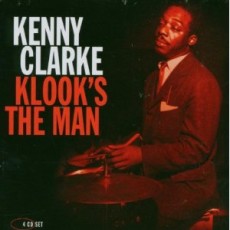
Daily Dose Of Jazz…
Born Kenneth Spearman Clarke on January 9, 1914 in Pittsburgh, Pennsylvania, Kenny Clarke grew up in a musical family, studied multiple instruments, including vibes and trombone, as well as music theory and composition while still in high school. As a teenager he played in the bands of Leroy Bradley and Roy Eldridge. He later toured around the Midwest for several years with the Jeter-Pillars band that also featured bassist Jimmy Blanton and guitarist Charlie Christian. By 1935, he was more frequently in New York, where he eventually moved and worked in groups led by Edgar Hayes and Lonnie Smith.
While working in the bands of Edgar Hayes and Roy Eldridge, Clarke started developing the rhythmic concepts that would later define his contribution to the music. He began experimenting with moving the time-keeping role from the combination of snare drum or hi-hat and bass drum to embellished quarter notes on the ride cymbal, the familiar “ding-ding-da-ding” pattern, which Clarke is often credited with inventing. One of these passages, a combination of a rim shot on the snare followed directly by a bass drum accent, earned Clarke his nickname, “Klook”, which was short for “Klook-mop”, in imitation of the sound this combination produced. This nickname was enshrined in “Oop Bop Sh’Bam”, recorded by Dizzy Gillespie in 1946 with Clarke on drums, where the scat lyric to the bebop tune goes “oop bop sh’bam a klook a mop.”
Clarke himself claimed that these stylistic elements were already in place by the time he put together the famous house band at Minton’s Playhouse, which hosted Monk, Parker, Gillespie, Russell, saxophonist Don Byas and many others while serving as the incubator of the emerging small group sound. While playing at Minton’s, Clarke made many recordings, most notably as the house drummer for Savoy Records. When the musicians from the Minton’s band moved to different projects, Clarke began working with a young pianist and composer John Lewis and vibraphonist Milt Jackson, and with the addition of bassist Ray Brown they formed the Modern Jazz Quartet or MJQ. The group pioneered what would later be called chamber jazz or third stream, referring to its incorporation of classical and baroque aesthetics as an alternative to hard bop.
Clarke stayed with the MJQ until 1955, relocating in Paris in 1956. As soon as he moved to Paris, he regularly worked with visiting American musicians in, as well as forming a working trio, known as “The Bosses”, with Bud Powell also a Paris resident and Pierre Michelot. In 1961 along with pianist Francy Boland, Kenny formed a regular big band “The Kenny Clarke-Francy Boland Big Band that lasted eleven years and featured leading European and expatriate American musicians, such as Johnny Griffin and Ronnie Scott.
Drummer Kenny Clarke continued recording and playing with both visiting U.S. musicians along with his regular French band mates until his death on January 26, 1985 in Montreuil-sous-bois. In 1988 he was inducted into the Down Beat Jazz Hall of Fame and his innovation set the stage for the development of the bebop combo, which relied heavily on improvised exchanges between drummer and soloist to propel the music forward.
More Posts: drums

